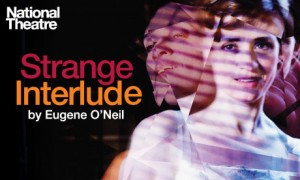Last night, I attended the National Theatre’s production of Strange Interlude by Eugene O’Neill. The play, which spans around twenty-five years, centers on Nina Leeds, who keeps several men in her life in her search for her idolized happiness. O’Neill’s characters use asides consistently throughout the play in a way that makes beautiful, sweeping sentences like, “Our lives are merely strange dark interludes in the electrical display of God the Father,” more believable and less affected.
I thoroughly enjoyed the production. The set design was marvelous and consistent with the play. Set on a revolving turntable—a choice that tends to give the impression that the characters are going in circles—the scenery represented both fragmentation and interrelation and at several points bore a resemblance to a spider web, as if Nina was bound to repurpose every man’s pursuit of her love.
The play’s questions are in line with many of the questions I have been asking myself recently. Nina tries to systematically approach happiness by acquiring all she wants from different people rather than simply doing the things that make her happy. She seeks to possess happiness, not to experience it, and because of this desire for control, she is always left wanting. If you, my dear anonymous reader, cannot see this particular production, then I highly recommend picking up a copy of the play. It is a remarkable, tender, and at times strange look into our lives.
